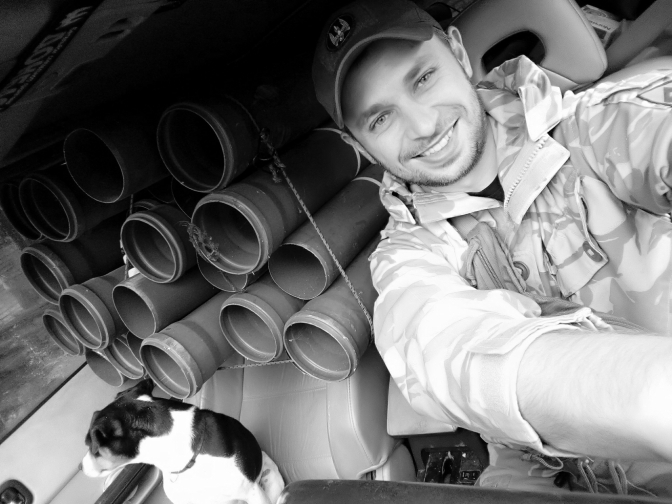
«Dobryi» (Good) is not even an army nickname, but rather a secret pseudonym. When the Russians invaded Crimea, Lviv lawyer Yurko Dosiak and two of his friends decided to form a guerrilla detachment to counter a possible occupation. They trained in the Sykhiv Forest under the guidance of the most experienced of the trio, a former officer of special forces, and decided to take on pseudonyms like the real partisans of old. Yurko joined in the Donbas Volunteer Battalion and met another «Dobryi» in a training unit near Kyiv. It seemed that one of them better change his nickname, but instead they opted for Dobryi-senior and Dobryi-junior.
Later, there was the frontline, the liberation of Popasna, the battles for Maryinka, the attack on Ilovaisk, the exit from the encirclement, and captivity. Yurko spent four months in a basement in Donetsk, which is controlled by Russian-backed forces. He wonders why he is so often asked about captivity, because, in fact, the war was much more interesting. «War has its beauty,» he says, admitting that he would like to return to the frontline. But now, Yurko’s work is here.
In the village of Repekhiv, Lviv region, the man is repairing a dwelling where he spent his childhood to open a rehabilitation center for soldiers – both acting and former. He wants their psychological traumas to be treated with fresh air, silence, and work that brings joy – and the center is called in «Blahodarnyi Erodiy» (named after the work «Grateful Herod» by the most known Ukrainian philosopher of 18th century Hryhorii Skovoroda). In addition, Yurko has the ambition to create a profitable farm near the rehabilitation centre, which will provide several soldiers with jobs.
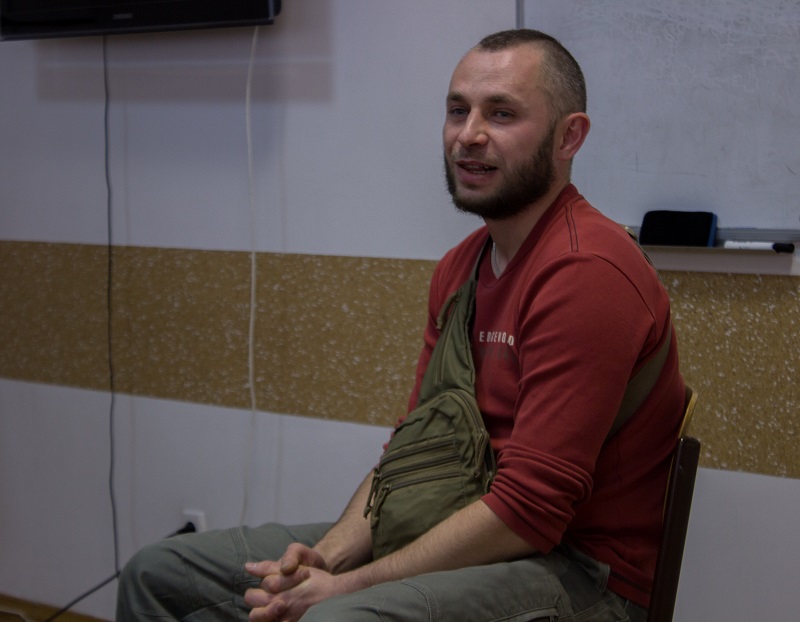
He told Tvoemisto.tv in an interview how it will work and why it is «habilitation» (inclusion), rather than rehabilitation:
«The feeling of war is hard to convey. It is a mixture of victory, fear, a sense of duty that you perform, a sense that you are in the right place among the right people. In war, you can see what people really are. In the most difficult situations, restrained, calm people are often incredibly heroic. Conversely, those who talk a lot about when to go to battle find a hundred reasons to stay at base.
«In captivity I really wanted to read books. There, I experienced the same set of emotions every day: I want to eat, I want to go home, the fear of the unknown, the understanding that there is nowhere to retreat... Every day is painfully similar to another. And here appeared the first book. It was the «One Jerusalem» of Israeli General Uzi Narkis. During the Six Day War, he commanded troops that drove the Arabs out of Jerusalem. We read this book in turn – going to bed, and then passed it onto the next [captive], because there were a hundred people willing. When I read, I began to empathize with the characters, to feel other emotions that are not part of this daily set.
«The separatists looted everything valuable in the Donetsk SBU (regional department of the Security Service of Ukraine), but did not take the books. There were many publications about the Holodomor published during Yushchenko’s presidency in Ukraine (2005-2010). At that time, they were probably sent centrally, because most of them were in boxes. Every time we had the opportunity to visit one of the offices, we dragged books to our bomb shelter. In the end, we assembled a solid library of fifty books. In addition to reading, I was surrounded by people close in spirit, which helped me too. Volunteer fighters are mostly adventurous, so everyone has many interesting life stories. We told each other stories for one hundred and nineteen days.

«I decided that I was in debt to my child, so I have to be with her here, not at the front. Even in captivity, I planned that when we were released, I would not return to war immediately – although I wanted to, as I want now. But still, I will not go – at least until there are no offensive operations. Instead, I will build the country in the rear, engage myself in civic activities. I knew that several people from the battalion had become people’s deputies, and I thought about cooperating with them. And then I came back – and all this PTSD (post-traumatic stress disorder) began.
«Black pages of history – That’s what I jokingly call my attempt to run as a deputy for the City Council from «Samopomich» (mayor’s political party). It was a moment of great disappointment. I sincerely believed that I could change something, but I saw that the wrapper was different from the middle. It was disappointing that politicians who declared their willingness to work with honest and enterprising people were actually cunning – they needed controlled colleagues.
«I think I was expelled from the centre for providing services to war veterans precisely because they weren’t sure if I would act as they wished. And they understood that it would not be possible to «negotiate» with me in that case. If I became a deputy of the City Council, I planned, first of all, to work with the social security of the military and participants of war. That’s because the person’s willingness to go fighting depends on how social security works. But I think it’s good that I did not become a deputy – I still had an unstable psyche at that time, and I could become even more disappointed. After all, it was just an interesting experience.
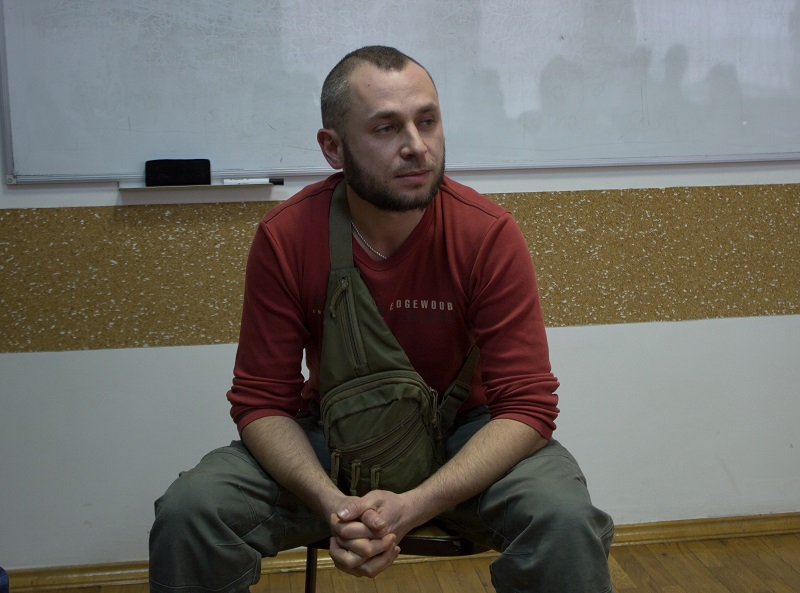
«There is a whole church of PTSD witnesses – people who promote the idea of post-traumatic stress disorder. It seems strange to me that when a fighter returns from the war, people immediately start to tell him: you are not like us, you have PTSD, we will treat you and teach you to live with others. This is imposed from all sides. You come home – and the family also starts behaving like that, because it has already been prepared. In fact, no one knows what a PTSD is. There are good psychologists who know how to work with these disorders, but they are also studying it now. And I’m not ready to become the object of experiments – I’d better experiment on myself alone.
«PTSD theory is based on the experience of American psychologists. But the Americans last fought on their own land one and a half hundred years ago, when they pacified the Indians. The war in Iraq is totally different from what we have here: the realization that you are protecting your home gives a lot. Therefore, the American experience cannot simply be transferred to our conditions. In fact, there are some people who find it difficult. Among the one hundred people who were with me in captivity and were released, half of the ten are drinking, seventy returned to the war, and twenty-five engaged in public activities.
«I have a feeling similar to what is called a PTSD. However, it’s not about scary pictures from the war, but from the fact that you come back, behave like an active citizen for a while… But then you get scared that everyone really doesn’t care where you were, what you did, what you risked. I lacked a person who would listen to me, who would ask questions about what I went through, and who would be interested.
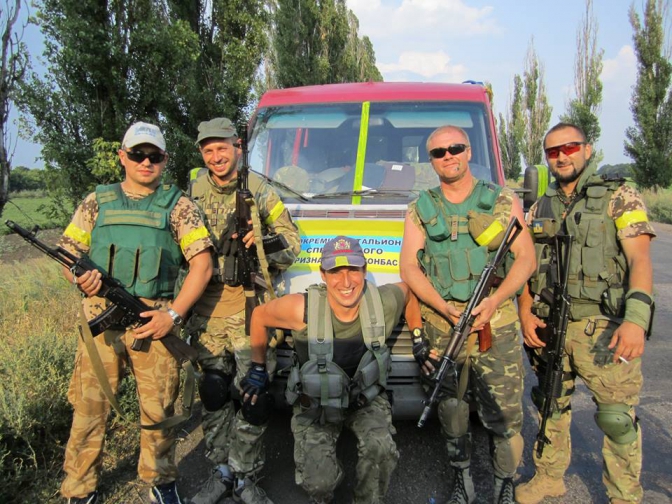
«There are people who care about war and those who are indifferent. It is not necessary to fight: someone volunteers, someone donates a few hryvnias, someone just puts a candle in the church for a soldier. But people who pretend there is no war irritate me. Strongly. That’s why I’m in favor of chasing evaders – but only to remind them of the war. They would become mediocre fighters. «Avatars» in the war were people who did not want to be there – alcohol helped them move to another reality. However, during the war, even conscripts may be needed.
«I am much happier with myself after the war than before. I was a lawyer for a retail chain, became a fighter, and now I am a farmer. It gave me the understanding that I could become anyone I wanted to be. The war deepened my worldview, expanded the circle of communication. When I returned, I talked a lot with my pre-war friends. But then I noticed that the stories I tell are mostly about the war. It was awkward for my friends to listen to them, and I began to feel out of place in the old company. Conversely, fighters are people who are interested in the topic of war. Although this is not the only thing we converse about: I can talk to them about literature and high art. But memories of the war are what unite us.
«‘Grateful Herod’ began in the courtyard, where I spent a happy childhood. There is a house of my grandpa and grandma. This is a territory, literally and figuratively fenced off from anyone who is not wanted there. The primary goal of this project is to rehabilitate yourself, because you can’t help someone else without checking for yourself if that help works. And the place with which good memories are connected is the place where it is best to restore the psyche.
«Socialization is the first thing a person who has returned from war needs. Very often such a former warrior cannot or does not want to work in the old profession. The work from nine to six in the office starts straining him, and he’s constantly looking for something else. For example, one of my colleagues, who was a lawyer in a large company, just like me, now works on his farm that breeds bumblebees.
«There will be several areas on our farm: beekeeping, cheese making, sausage and greenhouses. Four or five people will get a job, and the proceeds from the sale of products will finance the rehabilitation center. People who come to rehabilitation will also be able to participate in the work.
«I have bees, and honey is already on sale. I used to deal with bees earlier – my grandfather was a beekeeper. As a child, I did not understand why I had to learn this, and now I appreciate all the skills he passed on to me. I also planted vegetables, and next year I plan to start a cheese factory. I have rough numbers and people who know the finances and can help with a business plan. There are not enough hands: there are people who are already ready to work, but they need to be paid.
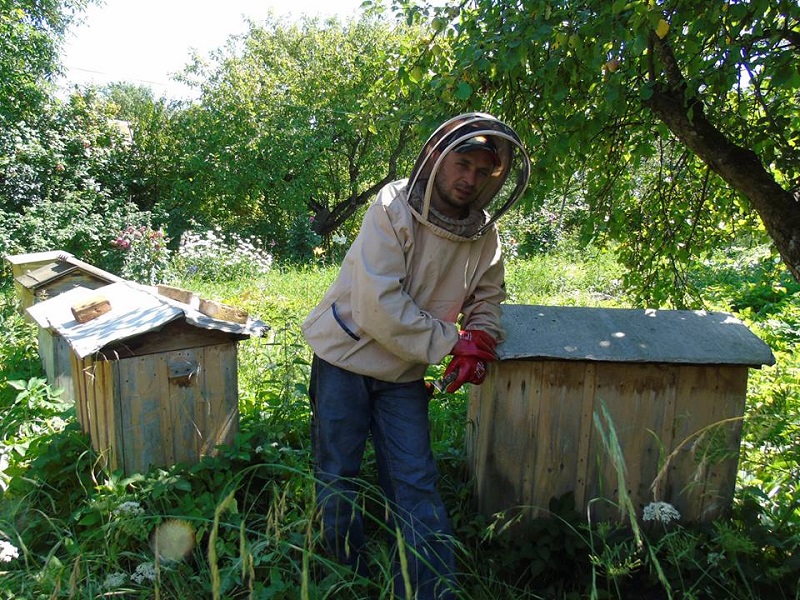
«In Lviv, there are about fifty unions of war participants. But mostly they are created as levers of influence: to recruit a lot of people and bring them for a protest against the City Council, for example, to achieve the right solution for someone. Former volunteers from different battalions and I decided to create our own union, but on a different principle – it will be a cohort of people who care about what is happening in the country. Who are ready to cooperate and help each other. We will win not with quantity, but quality.
«Rehabilitation is a return to the previous state. But a person who does not have an arm or a leg cannot become what he was. And psychologically, I would not want to return to the state I had before the war. Therefore, what we will do is rather habilitation: learning to live with the experience you have had in the war. Many veterans now attend psychological support groups; I would like such a support group to be constant in «Grateful Herod».
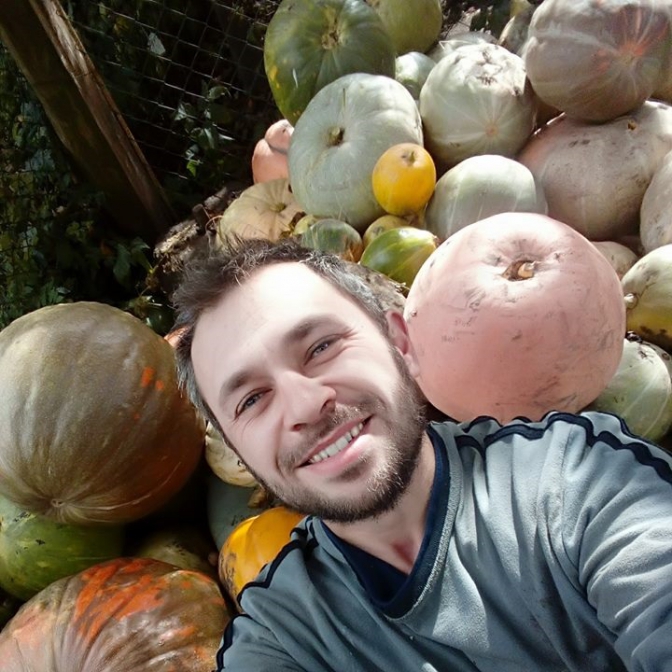
«It is impossible to return fully while the war continues. But I will know that here, in the rear, I have reached a new level and I can develop further when I and five other people can earn on my farm. But the plans are far-reaching, I’m not going to stop saving the world. Most successful uprisings and riots in Ukrainian history began with the peasantry, and it was not for nothing that Lenin regarded the peasants as an enemy class. I decided to take a closer look at this part of society. Now, it has declined somewhat, but that can be changed. «Peasant» does not necessarily have to be synonymous with the word «rahul» (disparaging Ukrainian word describing an uneducated and narrow-minded person). And I’m going to become an icebreaker of the peasant class. Well, the revolution is already as God wills:)»
Yuri Dosyak spoke with Otar Dovzhenko
Translated by Vitalii Holich
Photos by Daria Skrypniuk and provided by Yurk Dosyak
To receive our weekly email digest of stories, please follow us on Substack.












